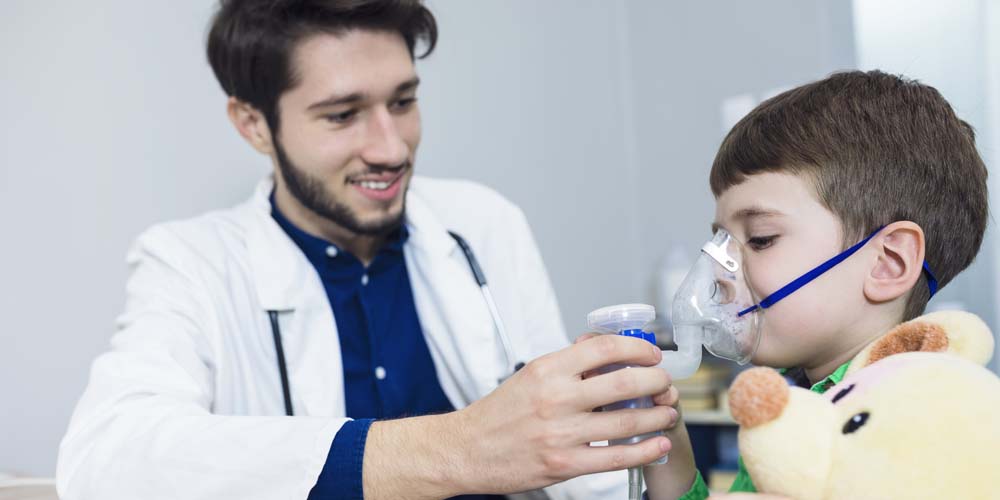Administering hope
Those who need respiratory therapy have difficulty breathing. Sometimes it’s temporary, following injury or surgery. Sometimes it’s lifelong because of a chronic health condition.
But it’s always debilitating.
As a respiratory therapist, you’ll give patients hope as well as physical relief by administering treatments, teaching them to use medical equipment, guiding them through exercises and monitoring their respiratory rates and blood oxygen levels to ensure they’re getting the care they need.
For a look at all the courses in our program, consult the course list.

Expert faculty
Our program is taught by certified respiratory therapists who know how it feels to receive gratitude from a patient you’ve helped breathe easier.
From them, you’ll learn about:
- Oxygen therapy
- Resuscitation
- Airway management
- Drawing/evaluating blood gas
- Mechanical ventilation
- And much more!
In the second year of the program, you’ll be assigned a clinical internship at a local hospital or health care facility to get practical experience working with patients.
And credits earned in our program transfer if you decide to pursue a bachelor’s degree.
Want to take the next step?
Dr. Richard Zahodnic is our program advisor and he’d be happy to talk to you. Call him at 586.286.2033.
A hospital needs you
There’s a shortage of respiratory therapists and hospitals are challenged to meet the critical needs of patients.
Use this handy tool to see what’s available locally and what you can expect to learn.
And if you haven’t been recruited by a hospital by the time you graduate with your associate degree, our Career Services team can assist you with searching for a job and preparing your resume.
Additional Information
Select programs in Health and Human Services require specific criteria to gain admission, such as testing requirements or minimum grade point average in prerequisite courses. Please view the Selective Admissions program application packet for information on application requirements, ranking and deadlines.
For information on how to apply to a Selective Admissions program, please email us at selectiveadmissions@macomb.edu. Selective Admissions applicants are encouraged to meet with an academic advisor or counselor prior to submitting an application to the program. This meeting will allow for review of the application process, program prerequisites and requirements. Contact the Counseling and Academic Advising Office at 586.445.7999 for office hours.
Program Outcomes
- Program outcomes data which includes, attrition, job placement, Certified Respiratory Therapist (CRT) success, Registered Respiratory Therapist ( RRT) success, overall graduate satisfaction, overall employer satisfaction, and on-time graduate rate for Macomb Community College may be viewed at the following site: https://coarc.com/students/programmatic-outcomes-data/
- CoARC accredits respiratory therapy education programs in the United States. To achieve this end, it utilizes an "outcomes based" process. Programmatic outcomes are performance indicators that reflect the extent to which the educational goals of the program are achieved and by which program effectiveness is documented.
- The data there is from a three-year rolling average.
Essential Functions for the RSPT Student
To ensure your success, please read the essential skills you’re expected to have before entering our program.
Goal Statement
To prepare graduates with demonstrated competence in the cognitive (knowledge), psychomotor (skills), and affective (behavior) learning domains of respiratory care practice as performed by registered respiratory therapists (RRTs).
The Respiratory Therapy program, CoARC program number 200071, Associate of Applied Science Degree in Respiratory Therapy, Center Campus is accredited by the Commission on Accreditation for Respiratory Care (CoARC).
CoARC’s address is 264 Precision Blvd., Telford, TN 37690. Phone: 817.283.2835.
CoARC accredits respiratory therapy education programs in the United States. To achieve this end, it utilizes an ‘outcomes based’ process. Programmatic outcomes are performance indicators that reflect the extent to which the educational goals of the program are achieved and by which program effectiveness is documented.
The goal of the Health and Public Services Division is to prepare every student to think critically and practice competently and compassionately in rapidly changing environments. All efforts are designed to build knowledge, enhance practical skills, and promote patient and the population’s safety. Furthermore, the program is designed to foster professional integrity and ultimately improve the health outcomes and protection of patients, families, and communities across the continuum of care and practice. Students must possess certain functional abilities, essential for the delivery of safe, effective clinical care and protection of the public during clinical and internship training activities in the field. Therefore, the faculty has determined that certain technical standards are required for admission to, progression in, and graduation from the Health and Public Services (HPS) programs.
In addition to classroom learning, clinical and internship learning occurs throughout the HPS programs and involves considerations (such as patient and population safety and clinical and internship facility safety) that are not present in classroom accommodations. Applicants or students interested in HPS programs who seek accommodations prior to or immediately after enrolling in the college are highly encouraged to also request an assessment of the types of reasonable accommodations needed for the clinical and or internship components of the program.
An individual must be able to independently, with or without reasonable accommodation, meet the following technical standards of general abilities: (1) observation; (2) communication; (3) motor skills; (4) intellectual, conceptual, and quantitative abilities; (5) essential behavioral and social attributes; and (6) ability to manage stressful situations. Individuals unable to meet these technical standards, with or without reasonable accommodation will not be able to complete the programs and are counseled to pursue alternative careers.
SPECIAL SERVICES STATEMENT: Students may individually discuss the essential functions and technical standards with a college counselor from our Special Services department. In compliance with Section 504 of the Rehabilitation Act of 1973 and the American Disability Act of 1991, academic accommodations may be provided to students who have a documented disability.
For further information, visit Special Services.


